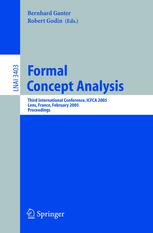

Most ebook files are in PDF format, so you can easily read them using various software such as Foxit Reader or directly on the Google Chrome browser.
Some ebook files are released by publishers in other formats such as .awz, .mobi, .epub, .fb2, etc. You may need to install specific software to read these formats on mobile/PC, such as Calibre.
Please read the tutorial at this link: https://ebookbell.com/faq
We offer FREE conversion to the popular formats you request; however, this may take some time. Therefore, right after payment, please email us, and we will try to provide the service as quickly as possible.
For some exceptional file formats or broken links (if any), please refrain from opening any disputes. Instead, email us first, and we will try to assist within a maximum of 6 hours.
EbookBell Team

0.0
0 reviewsThis volume contains the Proceedings of ICFCA 2005, the 3rd International Conference on Formal Concept Analysis. The ICFCA conference series aims to be the premier forum for the publication of advances in applied lattice and order theory, and in particular scienti?c advances related to formal concept analysis. Formal concept analysis is a ?eld of applied mathematics with its mat- matical root in order theory, in particular in the theory of complete lattices. Researchers had long been aware of the fact that these ?elds have many - tential applications. Formal concept analysis emerged in the 1980s from e?orts to restructure lattice theory to promote better communication between lattice theorists and potential users of lattice theory. The key theme was the mathe- tization of concept and conceptual hierarchy. Since then, the ?eld has developed into a growing research area in its own right with a thriving theoretical com- nity and an increasing number of applications in data and knowledge processing, including data visualization, information retrieval, machine learning, data an- ysis and knowledge management. ICFCA2005re?ectedbothpracticalbene?tsandprogressinthefoundational theory of formal concept analysis. Algorithmic aspects were discussed as well as e?orts to broaden the ?eld. All regular papers appearing in this volume were refereed by at least two, in most cases three independent reviewers. The ?nal decision to accept the papers was arbitrated by the Program Chairs based on the referee reports. It was the involvement of the Program Committee and the Editorial Board that ensured the scienti?c quality of these proceedings.